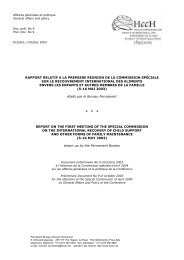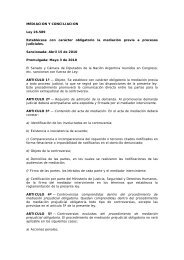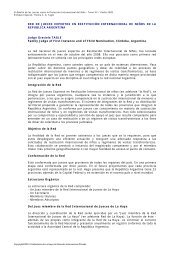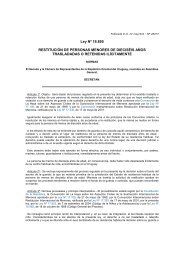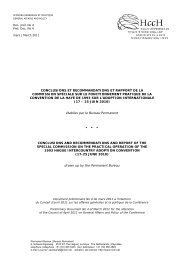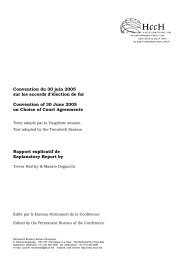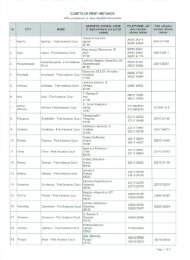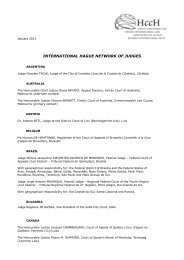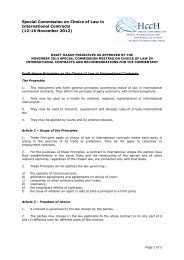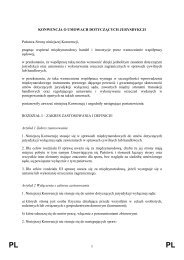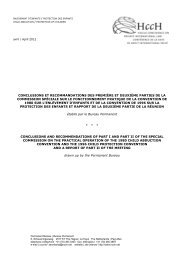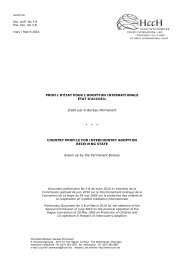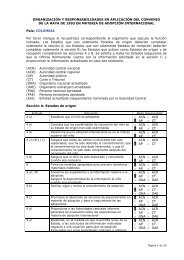aperçu des réponses au questionnaire accompagnant la ... - HCCH
aperçu des réponses au questionnaire accompagnant la ... - HCCH
aperçu des réponses au questionnaire accompagnant la ... - HCCH
Create successful ePaper yourself
Turn your PDF publications into a flip-book with our unique Google optimized e-Paper software.
Question Réponse / Reply État / State<br />
The Nether<strong>la</strong>nds does not have dual-dating problems with the Convention in connection with the fictitious<br />
service system. In terms of <strong>des</strong>ignated periods, only the service date in the Nether<strong>la</strong>nds is relevant. The notification<br />
date abroad is only important in terms of the requirements regarding time specified in Article 15 of the Convention.<br />
We have no views on dual-dating systems, although typically United States courts will look to the actual date that a<br />
defendant has received the service of process as the operative date of service.<br />
[F] Québec : Le problème ne s'étant pas posé en droit québécois, <strong>la</strong> solution du système de <strong>la</strong> double date nous<br />
apparaît inutilement complexe. IPE : Aucun problème. Alberta : Ce<strong>la</strong> semble une approche raisonnable.<br />
[E] Quebec: Since the problem has not arisen in Quebec <strong>la</strong>w, the solution of the double date system seems to us to<br />
be unnecessarily complicated. PEI: No problem. Alberta: It seems like a reasonable approach.<br />
Pays-Bas<br />
Etats-Unis<br />
Canada<br />
The dual-dating system is not applicable in our judicial system and is not easy to comprehend it. Bulgarie<br />
It is unknown in our legal system and is not easily comprehended. Since the responsibility of the service never<br />
lies with a party, we cannot imagine a situation where such system would have any practical consequences in our<br />
civil procedure.<br />
We would not be in favour of introducing a system with double dates for determining the date of service. The<br />
Convention should not try to harmonise the domestic rules on service but only facilitate cooperation between courts.<br />
Under the <strong>la</strong>w in Hong Kong, time starts to run when service is completed. We are not keen on the dual<br />
dating system. In addition to the arguments against the dual-dating system discussed in the <strong>la</strong>st paragraph of<br />
section II,1,E,f of the General Comments prepared by the Permanent Bure<strong>au</strong>, we are also concerned about the need<br />
to ascertain the foreign <strong>la</strong>w with regard to the determination of the date of service. This would involve the<br />
introduction of expert evidence on a simple matter such as the date of service. The cost and time involved may not<br />
be justified. This may also unduly prejudice the interests of the p<strong>la</strong>intiff.<br />
The dual-dating system does not exist in the MSAR legal system. Therefore, even if in theory some of the<br />
benefits arising from the implementation of such a system can be recognized, in practice, it would be very<br />
difficult to implement such a system as it implies modification of our domestic procedural rules.<br />
The date of service is normally the date when the documents are delivered to the addressee. We would not be in<br />
favour of introducing a system with double dates.<br />
Germany uses the system of a uniform date of service. Decisive in this is not the transmission of the document to<br />
the Central Authority or to a court, but rather the date of the service itself, or otherwise the direct knowledge<br />
thereof on the part of the addressee. Compared to those States which use the date of the transmission of the<br />
document to an <strong>au</strong>thority as the date of service, problems have arisen in certain cases where the date of the actual<br />
service on the addressee with reference to domestic <strong>la</strong>w was not additionally specified on the documents. After all,<br />
the Convention itself also requires that the documents, including the request section on the essential content of the<br />
documents, are to be delivered to the addressee (cf. Art. 5(4)), and that this delivery is to be documented in the<br />
certificate of due performance of service (“The documents referred to in the request have been delivered to:...").<br />
In re<strong>la</strong>tion to EC Regu<strong>la</strong>tion 1348/2000 Portugal dec<strong>la</strong>red its intention to derogate from article 9 (2) on the grounds<br />
of the imprecision and uncertainty than can result from the determination of two different dates of<br />
service, set by reference to the <strong>la</strong>ws of two different countries, to the detriment of legal certainty.<br />
L’Union considère que le régime de <strong>la</strong> double date, s<strong>au</strong>f à imposer un système, à l’instar du Règlement 1348 de l’UE,<br />
est insoluble. En effet, suivant <strong>la</strong> conception qu’épouse chaque Etat sur <strong>la</strong> date de prise d’effet de <strong>la</strong> notification ou<br />
de <strong>la</strong> signification, le point de départ <strong>des</strong> dé<strong>la</strong>is peut varier. La France s’est adaptée <strong>au</strong> Règlement en modifiant son<br />
code de procédure mais be<strong>au</strong>coup de pays continuent à appliquer leur propres règles. Au demeurant, le système<br />
Rép. Slovaque<br />
Suède; voir <strong>au</strong>ssi<br />
Fin<strong>la</strong>nde et Japon<br />
Chine (Hongkong)<br />
Chine (Macao)<br />
Norvège<br />
Allemagne<br />
Portugal<br />
UIHJ<br />
Page 44 of 69



